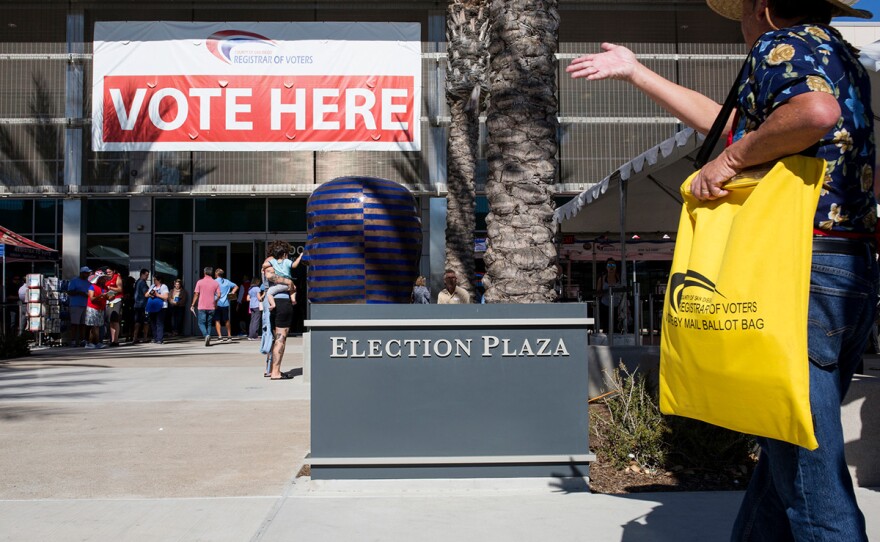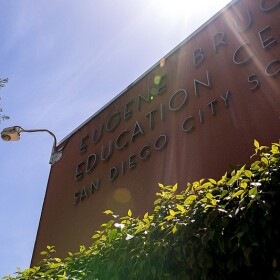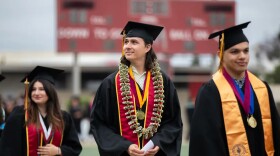Reversing a vote from last week, the San Diego County Board of Supervisors on Monday approved four satellite voting offices ahead of the March primary election, over the fierce objections of one member.
The vote was 3-1. Supervisors Greg Cox, Nathan Fletcher and Dianne Jacob were in favor, while Supervisor Jim Desmond was opposed. Unlike last week's meeting, the proposal merited approval from three board members.
Supervisor Kristin Gaspar left the chamber before the board vote, after saying she was "being asked to revisit a vote that we have already made, to overturn the will of this board." She also said that Monday morning's special meeting was planned by three members of the board, and that neither she nor Desmond were asked to attend.
"Today, there is no purpose in me casting a vote, when the outcome is predetermined," Gaspar said. "We can disagree on a policy; we should not disagree on democracy itself."
Several people clapped after Gaspar finished speaking.
Gaspar spokeswoman Itica Milanes later told City News Service that when it comes to calling a special meeting, it is county protocol for the board chair to consult with other supervisors' calendars, but "this didn't happen this time."
Jacob, who chairs the board and requested the special meeting, did not offer a formal response to Gaspar's allegation. However, without identifying anyone, Jacob criticized "political grandstanding" by critics of the proposal.
The satellite voting office proposal stemmed in part from state legislation, recently signed by Gov. Gavin Newsom, that allows Californians to register to vote on election day at local polling places and voting centers.
The cost of the four satellite offices was estimated at nearly $1 million: $350,000 for salaries and benefits, and $550,000 for services and supplies.
According to documents provided by Jacob's office, the county will transfer appropriations of $900,000 from the Finance and General Government Group to the Registrar of Voters budget to pay for the satellite locations. Before Monday's vote, Jacob said the county will pursue reimbursement from state for $615,000 costs. She added that the county has recovered $114 million in unfunded state mandates in the past.
"Merits of this proposal should not be judged by the funding source," Jacob said. "It should be judged by our obligation to follow the law."
County Registrar Michael Vu told the board that satellite offices will help his office accommodate the "big wave" of voters expected next year.
Vu said during the last year's general election, there were lines over five football fields long at the county Operations Center in Kearny Mesa.
"The last person to enter the ROV (Registrar of Voters) building was at approximately midnight on election day," Vu said. "Can this occur again? Yes, we should expect it."
With 120 days left until the March primary, "my team and I need certainly and finality to prepare for the upcoming election," Vu said. "We cannot duck our head in the sand."
Fletcher said he was properly informed about the special meeting and had no conversation with Jacob about it beforehand. While the board deals with complex issues such as improving behavioral health, "we're talking about four little vote centers to give residents of the supervisorial districts something mine has had for a long time," he said. "We find money to do all kinds of things that are optional."
Cox also said he didn't "conspire to have this meeting," and rescheduled several other official gatherings to attend it.
Four satellite offices costs are a tiny fraction of the county's $6.2 billion budget, Cox said.
"We cannot do democracy on the cheap," he added. "Whatever we can do to make it easier for people to vote, we should."
Desmond, who said he had to leave another county-related meeting early to attend the special meeting, said he appreciates all the burdens put on Vu's office brought on by state laws.
"I'm tired of unfunded mandates by the state," Desmond said. "Where do we draw the line? When's it gonna stop?"
Desmond added that no one is being disenfranchised, as all regular polling places will be open.
Earlier in the meeting, the board heard from grassroots organizations and a Service Employees International Union representative in support of the satellite offices.
Shane Harris, president of the People's Alliance for Justice, said while at the Registrar of Voters during the 2016 election, he saw "very, very long lines."
"I heard people murmuring that they needed to leave to get to work," Harris said. "It was very concerning to me. I'm here to ask to expand this voter outreach to ensure that people's voices across this county are heard."







